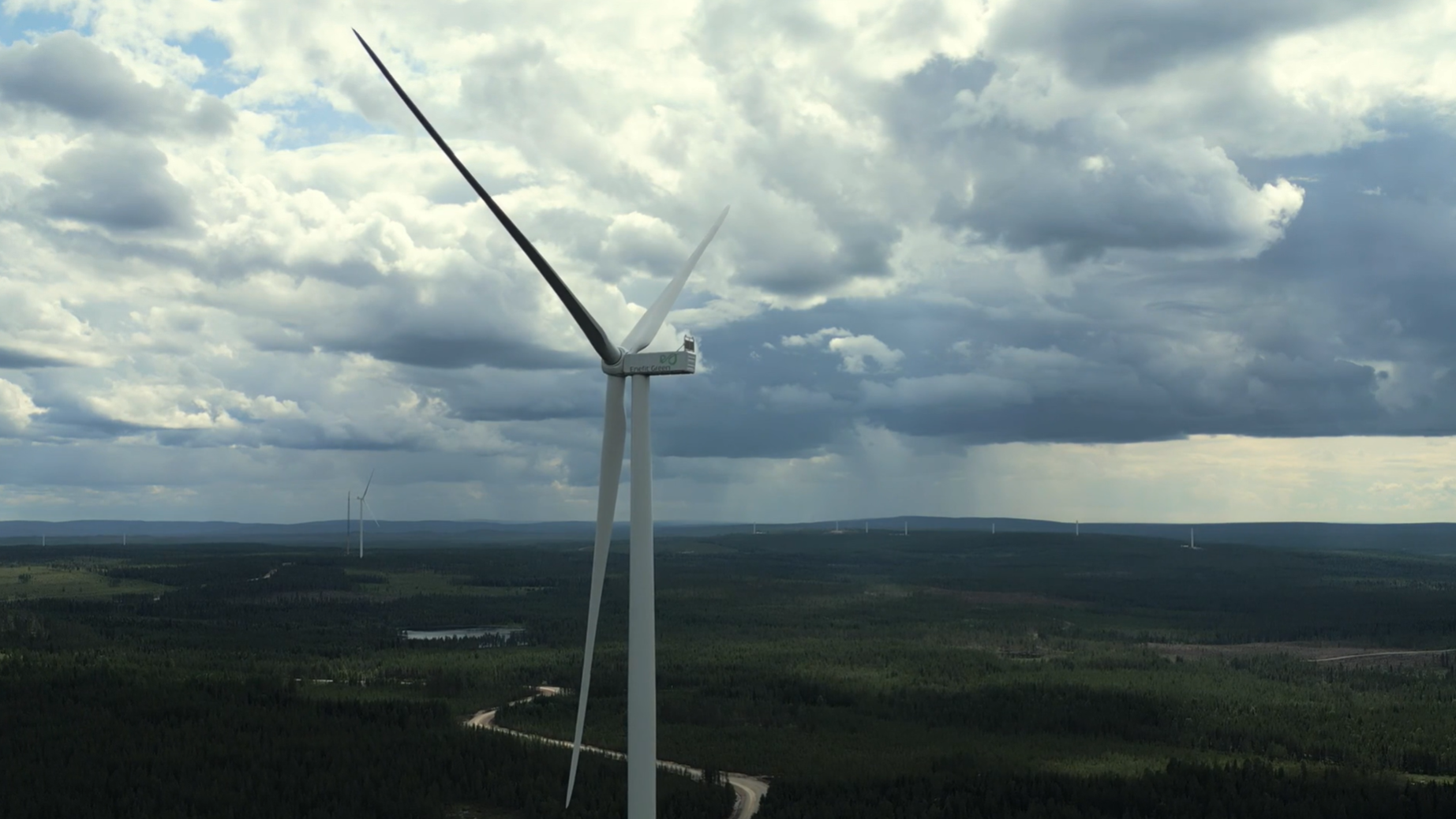
Veiko Räim, CFO of Enefit Green, stands on the left, while Lauri-Olavi Siitam, Wind Energy Project Manager at Enefit Green, is in the foreground. They are giving a tour of the new wind park.
13 Jun 2024
Enefit Green celebrates new Tolpanvaara wind park amid industry headwinds
Renewable energy producer Enefit Green is forging ahead with expansion plans. The Estonian company recently celebrated its first wind park in Finland, despite an industry struggle with profitability and rising construction costs. While some renewable energy companies are scaling back and reevaluating investments due to the shifting economic landscape, Enefit Green remains committed to its growth strategy.
Some 100 kilometres northeast of Oulu, Finland, the 13 wind turbines of Enefit Green’s Tolpanvaara Wind Farm stand as the latest example of Europe’s commitment to green energy. These towering turbines, reaching heights of 229 meters, are firmly anchored in the Finnish bedrock.
“This is our first wind farm in Finland, and in my opinion, it is our most beautiful one yet. The location and scenery are stunning, and it stands as our northernmost project,” Veiko Räim, Member of the Board and Chief Financial Officer of Enefit Green, says.
The wind turbine blades have been designed to withstand Finland’s frosty weather conditions.
“We’ve collaborated extensively with Nordic partners on the infrastructure and development and seeing the wind park ready fills us with pride.”
The wind park completed this spring, and although its first winter is still ahead, its northern location has already brought unexpected experiences.
“One fascinating aspect are the frequent visits from reindeer. They seem to enjoy the site, often using the roads to move around and sunbathing in the ditches,” says Lauri-Olavi Siitam, Wind Energy Project Manager at Enefit Green.
The 76.5-megawatt project is capable of supplying energy to up to 40,000 homes. In Finland, the wind park is considered mid-sized. The added renewable capacity is needed.
Europe’s electricity system is set for transformative changes in the coming decades. According to modelling by the think tank Agora Energiewende, national targets indicate that 96% of Europe’s electricity will come from renewables, primarily wind and solar, by 2050, up from 44% currently.
In addition, societies are electrifying at an accelerating pace, further driving up demand.
Headwinds for the green transition
Despite this, the renewables industry has found itself in headwinds.
While wind power is a mature renewable energy technology and crucial for the green transition, it faces vulnerabilities.
“The wind industry has grown and developed rapidly over the last decade, with turbines becoming larger and more powerful. However, manufacturers still struggle with profitability and rising construction costs. Recent reliability issues also highlight the need for better testing,” says Räim.
The primary challenge lies in the interplay between macroeconomic factors such as energy costs and interest rates, and investment decisions. Lately some power companies have scaled back, or are reviewing their targets to develop renewable energy, because of high costs and low electricity prices.
“Despite these challenges, I believe the industry will improve soon,” Räim adds.

Keeping the wind turbines turning
Already the biggest wind energy producer in the Baltic region, Enefit Green generates power from 24 wind and 42 solar parks. The company is confident that the Nordic-Baltic region needs a significant amount of new renewable energy capacities.
“In terms of opportunities, the wind industry remains the most competitive and cost-effective form of power generation in this part of the world. The future looks bright for both onshore and offshore wind, despite their unique challenges,” Räim says.
However, achieving a climate and nature-resilient economy requires substantial additional investments. This is where international financial institutions like NIB come into play. They are poised to bridge this financing gap by mobilising resources and attracting private investment, thereby driving the transition forward.
“The Tolpanvaara wind farm wouldn’t have been possible without our financing partners. We’ve had excellent cooperation with the Nordic Investment Bank and SEB Eesti. We’re excited about this collaboration and look forward to more projects together,” says Räim.
“The wind industry is here to stay and will continue to grow in the coming years.”

